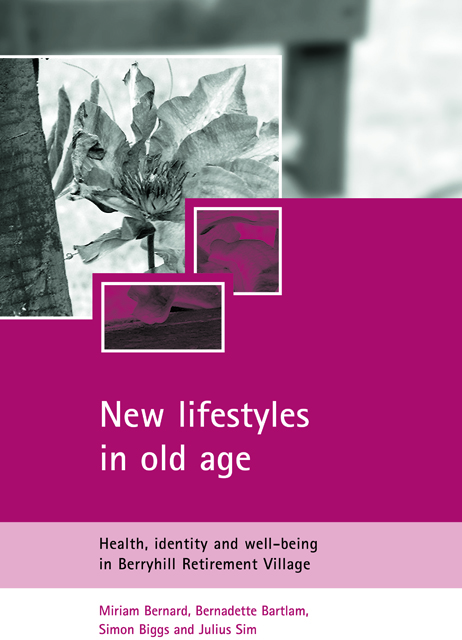Book contents
- Frontmatter
- Contents
- List of tables and figures
- Acknowledgements
- A day in the life of a retirement community resident
- 1 Retirement communities: the context
- 2 Developing a retirement community lifestyle: participation and involvement
- 3 Health and well-being
- 4 Growing older: age and identity
- 5 Conclusions
- References
- Appendix A Research questions
- Appendix B The study’s timeline
- Appendix C Questionnaires
- Appendix D Interviews
- Appendix E Participation groups and community conferencing
1 - Retirement communities: the context
Published online by Cambridge University Press: 06 April 2023
- Frontmatter
- Contents
- List of tables and figures
- Acknowledgements
- A day in the life of a retirement community resident
- 1 Retirement communities: the context
- 2 Developing a retirement community lifestyle: participation and involvement
- 3 Health and well-being
- 4 Growing older: age and identity
- 5 Conclusions
- References
- Appendix A Research questions
- Appendix B The study’s timeline
- Appendix C Questionnaires
- Appendix D Interviews
- Appendix E Participation groups and community conferencing
Summary
Introduction
Today, policy makers and providers are increasingly aware that housing and care services for older people need to be more flexible, innovative and inclusive. Developments designed to empower, provide choice and promote the autonomy of older people are being explored and encouraged (DoH, 2001; Peace and Holland, 2001; Riseborough, 2002). In Britain, one of the most recent developments is the creation of purpose-built retirement villages similar to those that have been around in North America and Europe for some time. The growing interest in such communities reflects both an awareness of the ageing of our population and a recognition that people are wanting more say in where and how they live, the design of their environments, and what kinds of care and support they might require in the future (Bernard and Phillips, 1998; Riseborough, 1998; Sumner, 2002). In addition, many middle-aged and older people are now actively exploring ways of developing new lifestyles and maintaining a positive identity in later life (Biggs, 1999a; Bernard et al, 2000). Retirement communities are particularly important in these regards not least because current social policy is promoting such developments as suitable for both ‘fit’ and ‘frail’ older people (ODPM, 2003). They also aim to create an environment that is intended to enhance a certain sort of ageing: one that is active, free of age prejudice and positive in its encouragement of certain forms of self-expression.
This report presents the findings of a three-year study (2000-03) which, though based on the experiences of people associated with one particular purpose-built retirement village: Berryhill in Stoke-on-Trent, was primarily designed to draw out the wider lessons for those who might be considering developing similar schemes. An earlier study had provided the managing organisation – The ExtraCare Charitable Trust – with a series of practice recommendations (Ray, 2001). Consequently, the focus of the present study was on what could be learnt more generally about how living in a new purpose-built retirement village affects the health, identity and well-being of residents. We were also interested in how people who work in, and have connections with, this kind of development perceive the growth of such communities for older people. A further underlying principle of the study, in keeping with the ethos of the funding body (the Community Fund) and of ExtraCare, was the notion of collaborative and participatory action research.
- Type
- Chapter
- Information
- New Lifestyles in Old AgeHealth, Identity and Well-being in Berryhill Retirement Village, pp. 1 - 11Publisher: Bristol University PressPrint publication year: 2004



